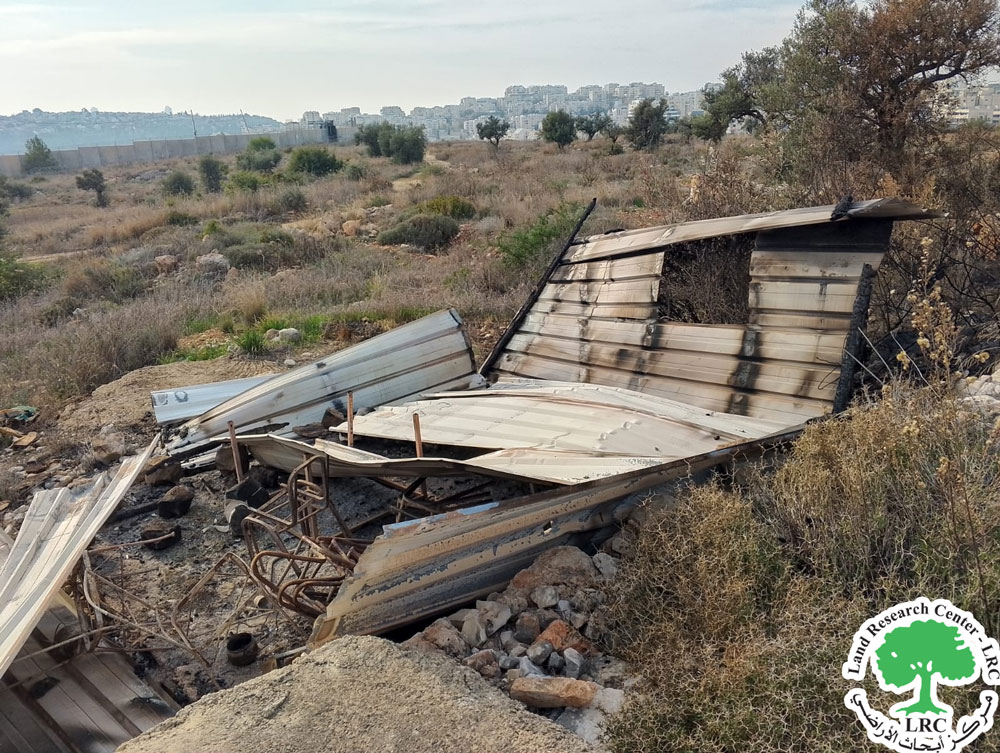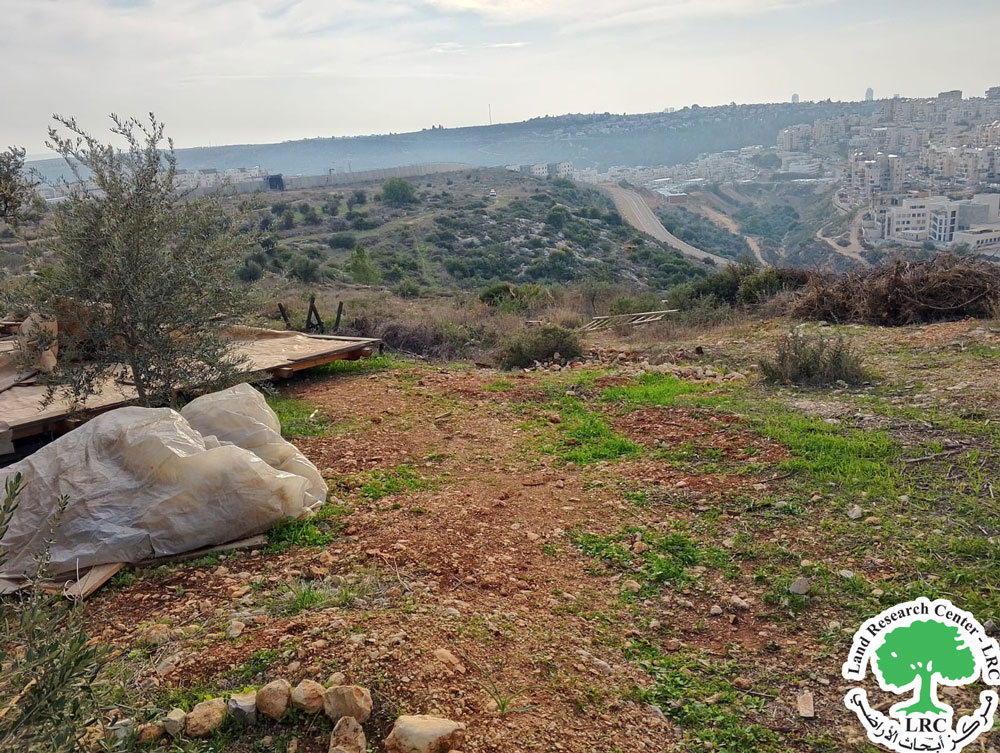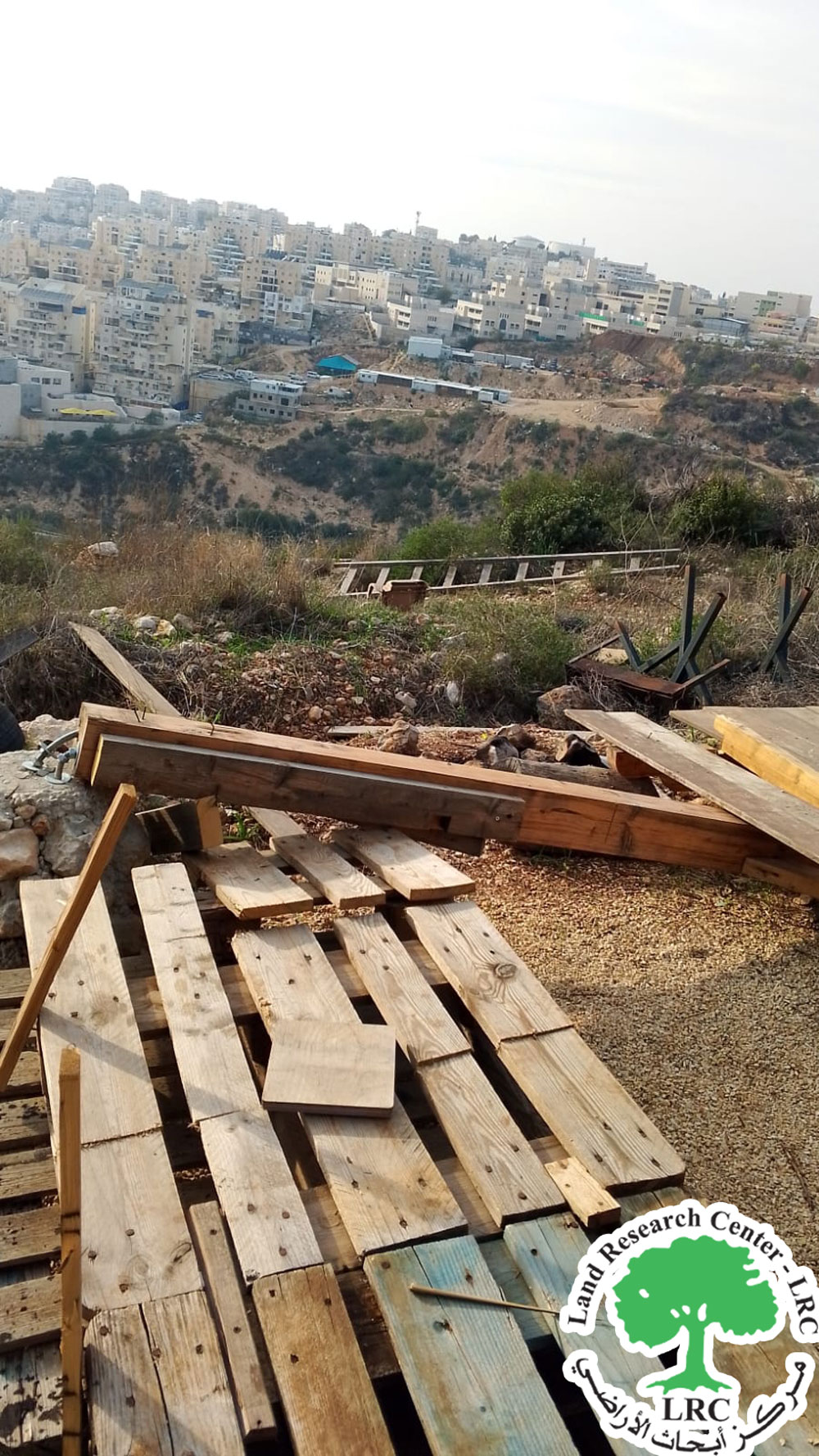Occupation Army Burns Agricultural Room and Destroys Farming Pergola in Bil'in Village / Ramallah Governorate
- Violation: Attack on agricultural facilities belonging to an environmentally friendly agricultural association.
- Location: Bil'in village, located west of Ramallah city.
- Date of Violation: 12/01/2025.
- Aggressor: Israeli occupation army.
- Affected Party: Um Suleiman Organic Farming Association.
Introduction:
Um Suleiman Organic Farming Association is an informal cooperative located in the Abu Lemon area west of Bil'in village, which is situated west of Ramallah and Al-Bireh Governorate. This farm was established in 2016 on land owned by citizen Mohammad Mansour from Bil'in village. The farm spans five dunams (approximately 1.25 acres) and contains a wooden pergola covering 20m² and a zinc room of 12m². Its concept revolves around ecological organic farming, meaning natural agriculture without the use of chemical fertilizers and pesticides, where the land is cultivated with various vegetables away from chemical substances.
The farm is located in "Area C" and is approximately 300 meters away from the annexation wall and the " Qiryat Sefer " settlement. It's worth noting that the farm and the wall are located to its west. When the farm was established, the Israeli occupation did not object or issue demolition notices, despite it including wooden buildings and tin structures, as well as a water pool, a bridge, and stone chains, and being surrounded by a metal fence and an iron gate.
Description:
The farm has witnessed an escalation in the pace of Israeli attacks, where occupation forces periodically raid the farm and tamper with its contents under the pretext that children are throwing stones at soldiers in an area near it.
Ms. Angham Mansour Ali Mansour, head of the association, reported the following to a researcher from the LRC:
"On the morning of Sunday, January 12, 2025, while we were heading to the farm at around eight in the morning, we were surprised to find the farm's iron door broken. Upon entering, we noticed the demolition of the wooden pergola covering 20m², where its wooden columns had been cut using sharp tools.
We accuse the Israeli occupation army of responsibility for this act, because the area is very close to the separation wall and no one can approach it at night except the occupation forces. This has caused us to fear for the rest of the farm's facilities, and we felt that it is considered a direct threat to it and to us, in addition to the material losses resulting from the demolition of this pergola."
Ms. Angham added:
"On the evening of the following day, 13/01/2025, a group of soldiers came during the afternoon hours to the farm and threatened to burn it if stone-throwing against them continued, despite our attempts to convince them that we have no connection to what is happening. However, the occupation army insisted on its threats. Indeed, during the early evening hours, around six in the evening, I received a call reporting a fire had broken out at the farm. I immediately headed to the site accompanied by a number of villagers, and we noticed that the fire had completely consumed a 'barracks' structure inside the farm. The fire was rapid, and we couldn't do anything because of the area's conditions and the presence of occupation forces nearby. Our work at the farm has become threatened by dangers, and we can't do anything about it. We have suffered significant losses."
Background on the Area:
The "Abu Lemon Reserve" area west of Bil'in is considered one of the sites that continuously faces Israeli harassment. The field research team at the Land Research Center previously documented the occupation forces' demolition of several agricultural facilities in the area, justifying it by lack of permits.
Agricultural Rooms in Israeli Targeting Scope:
The targeting of agricultural rooms built by Palestinian farmers on their land by the occupation army and settlers aims to discourage Palestinian farmers from their land. These rooms are used to store agricultural tools used in caring for their land, as well as for resting after tiring agricultural operations (plowing, irrigation, weeding, spraying pesticides, etc.). The occupation and its settlers aim through these attacks to intimidate the farmer so that reaching their land endangers their life, thus depriving farmers of safe access to their land.
The Land Research Center has documented the occupation authorities' demolition of 377 agricultural facilities since the beginning of the war on the Gaza Strip until the end of 2024, including 70 agricultural rooms. Settlers have also attacked 452 agricultural facilities by burning, vandalism, or destruction of agricultural property, including 110 agricultural rooms.
Therefore, the occupation army and its settlers are taking turns in attacking agricultural facilities and lands with the aim of emptying these lands and making Palestinians fear for their lives when accessing them, so they remain as colonial inventory.
Bil'in Village:[1]
Bil'in village is located to the northwest of Ramallah city, specifically at a distance of 12 km to the west, where it borders the 'Modi'in Illit' settlement in the territories occupied in 1948. The total area of Bil'in village is approximately 4,000 dunams (1,000 acres). In 2005, the separation wall isolated and destroyed about 2,300 dunams, with the wall extending 2 km at that time. The isolated lands were considered a primary source of income for most residents who used a large portion of them for cultivating grains and wheat.
The population of Bil'in village is approximately 1,900 people, most of whom work in government and private sector jobs, while agriculture is considered a supplementary source of income for most village residents. There are several main families in Bil'in village, most notably: Abu Rahma, Al-Khatib, Yassin, Ghanem, and Bilnat. It's worth noting that the separation wall was modified in July of the current year to reach a length of 1,800 meters, with 1,200 dunams remaining isolated behind the separation wall.
[1] Source: LRC 2011
مشروع: حماية الحقوق البيئية الفلسطينية في مناطق "ج" SPERAC IV - FCDO
Disclaimer: The views and opinions expressed in this report are those of Land Research Center and do not necessarily reflect the views or positions of the project donor; the Norwegian Refugee Council.
إخلاء المسؤولية: الآراء ووجهات النظر الواردة في هذا التقرير هي آراء ووجهات نظر مركز أبحاث الأراضي ولا تعكس بالضرورة وجهات نظر أو مواقف الجهة المانحة للمشروع؛ المجلس النرويجي. للاجئين



